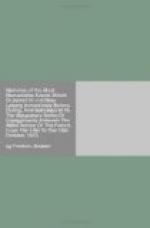In the city lay many thousands of newly-arrived troops, who came from the fight, and were both hungry and thirsty. Notwithstanding their moderation, some of these could obtain nothing, and others but a very scanty supply. Gladly would every citizen have entertained them in the best manner; but not even a glass of the worst beer or brandy was now to be had. Many of them naturally ascribed this to ill will, and even observed that every thing was denied them because they were not Frenchmen. How little did they know of our real situation! In the house where I live six of the Prussian foot-guards were quartered. They complained when nothing was set before them but dry potatoes; but listened with calmness to the excuses that were offered. Without making any reply, four of them took up their arms, and departed. In about an hour they returned, bringing with them two cows, which they had taken from the French. These they presented to their host, and immediately fell to work and killed then. In two hours the family was abundantly supplied with meat, so that it could assist others; and, as great part was pickled, it was supplied for a considerable time. Frenchmen would certainly not have acted thus.
Among the thousands of facts which might be adduced to prove that it was absolutely impossible for any thing whatever to be left in the town, that its resources were completely exhausted, and that extreme want could not but prevail, let one instance suffice. There were in the city two granaries, one of which, in the palace of Pleissenburg, had been filled at the king’s cost, and the other, called the corn-magazine, at the expense of the magistrates. The former had




